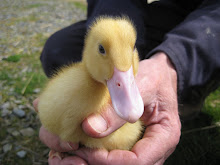 The workshop looked like something out of a game cookbook photoshoot; 2 brace of pheasant, 4 partridge, a solitary wild duck and a couple of pigeons swung by their feet, tied to the beam with baler twine awaiting an orgy of plucking. The feathers flew, the innards, heads and feet went in the rubbish and the freezer contents swelled. Something of this sort happens nearly every other weekend in the autumn and winter as the local farmer's Saturday shoot surplus finds its way to our door. Fantastically tasty and free meat - what more could you ask? Our stalwart providers said they took their hats off to us - that we were seemingly prepared to eat anything. Some distant memory of Hugh Fearnley-Wotsit eating squirrel resurrected itself - we've not tried squirrel yet we said. Two weeks later a very smiley face appeared carrying a very fat example of the breed; I suspect it had been their particular challenge that week to find us something new to tackle. A chubby grey squirrel that looked more like a stuffed toy than a food source sat on the chopping board and soon looked like a small skinned rabbit. We casseroled it in the luscious apple and calvados gravy left over from the previous night's pheasant. It smelled nice. It tasted fine. But it had the texture of an unreconstructed rubber tyre/wellie boot. The fact that the shotgun pellets had all collected under the skin and not penetrated into the muscle should have been more than a hint; the wee beastie was not so much fat as mature, I suspect.
The workshop looked like something out of a game cookbook photoshoot; 2 brace of pheasant, 4 partridge, a solitary wild duck and a couple of pigeons swung by their feet, tied to the beam with baler twine awaiting an orgy of plucking. The feathers flew, the innards, heads and feet went in the rubbish and the freezer contents swelled. Something of this sort happens nearly every other weekend in the autumn and winter as the local farmer's Saturday shoot surplus finds its way to our door. Fantastically tasty and free meat - what more could you ask? Our stalwart providers said they took their hats off to us - that we were seemingly prepared to eat anything. Some distant memory of Hugh Fearnley-Wotsit eating squirrel resurrected itself - we've not tried squirrel yet we said. Two weeks later a very smiley face appeared carrying a very fat example of the breed; I suspect it had been their particular challenge that week to find us something new to tackle. A chubby grey squirrel that looked more like a stuffed toy than a food source sat on the chopping board and soon looked like a small skinned rabbit. We casseroled it in the luscious apple and calvados gravy left over from the previous night's pheasant. It smelled nice. It tasted fine. But it had the texture of an unreconstructed rubber tyre/wellie boot. The fact that the shotgun pellets had all collected under the skin and not penetrated into the muscle should have been more than a hint; the wee beastie was not so much fat as mature, I suspect.
Tuesday, 16 January 2007
Squirrel for tea
 The workshop looked like something out of a game cookbook photoshoot; 2 brace of pheasant, 4 partridge, a solitary wild duck and a couple of pigeons swung by their feet, tied to the beam with baler twine awaiting an orgy of plucking. The feathers flew, the innards, heads and feet went in the rubbish and the freezer contents swelled. Something of this sort happens nearly every other weekend in the autumn and winter as the local farmer's Saturday shoot surplus finds its way to our door. Fantastically tasty and free meat - what more could you ask? Our stalwart providers said they took their hats off to us - that we were seemingly prepared to eat anything. Some distant memory of Hugh Fearnley-Wotsit eating squirrel resurrected itself - we've not tried squirrel yet we said. Two weeks later a very smiley face appeared carrying a very fat example of the breed; I suspect it had been their particular challenge that week to find us something new to tackle. A chubby grey squirrel that looked more like a stuffed toy than a food source sat on the chopping board and soon looked like a small skinned rabbit. We casseroled it in the luscious apple and calvados gravy left over from the previous night's pheasant. It smelled nice. It tasted fine. But it had the texture of an unreconstructed rubber tyre/wellie boot. The fact that the shotgun pellets had all collected under the skin and not penetrated into the muscle should have been more than a hint; the wee beastie was not so much fat as mature, I suspect.
The workshop looked like something out of a game cookbook photoshoot; 2 brace of pheasant, 4 partridge, a solitary wild duck and a couple of pigeons swung by their feet, tied to the beam with baler twine awaiting an orgy of plucking. The feathers flew, the innards, heads and feet went in the rubbish and the freezer contents swelled. Something of this sort happens nearly every other weekend in the autumn and winter as the local farmer's Saturday shoot surplus finds its way to our door. Fantastically tasty and free meat - what more could you ask? Our stalwart providers said they took their hats off to us - that we were seemingly prepared to eat anything. Some distant memory of Hugh Fearnley-Wotsit eating squirrel resurrected itself - we've not tried squirrel yet we said. Two weeks later a very smiley face appeared carrying a very fat example of the breed; I suspect it had been their particular challenge that week to find us something new to tackle. A chubby grey squirrel that looked more like a stuffed toy than a food source sat on the chopping board and soon looked like a small skinned rabbit. We casseroled it in the luscious apple and calvados gravy left over from the previous night's pheasant. It smelled nice. It tasted fine. But it had the texture of an unreconstructed rubber tyre/wellie boot. The fact that the shotgun pellets had all collected under the skin and not penetrated into the muscle should have been more than a hint; the wee beastie was not so much fat as mature, I suspect.
Monday, 1 January 2007
Ethics, morals and confusion
I rarely read any newspaper article with a man in a dog-collar featured at its head, but something about John Sentamu's piece, "Ethics must shape our global economy" made me press on. The Archbishop of York describes how feeble is the typical guess as to the meaning of ethics: a feeling of what is right or wrong; linking ethics to one's religious beliefs; thinking that being consistent with the law of the land will make your actions ethical. We can all think of examples when taking those as our ethical standards would have meant condoning or carrying out terrifyingly unjust actions.
The Archbishop describes ethics as referring to "well-based standards of right and wrong that prescribe what humans ought to do, usually in terms of rights, obligations, benefits to society, justice, or specific virtues - such as decency... ethical standards also include ... honesty, compassion, and loyalty... rights to life, freedom from injury, and privacy. Secondly, ethics refers to the study and development of one's standards... it is necessary to constantly examine one's standards to ensure they are reasonable and well-founded. Ethics...means...studying our moral beliefs and conduct, and striving to ensure we, and the institutions we help to shape, live up to reasonable, solidly based standards. We must always allow our standards to be open to question and judgement."
And that's when I moved from agreement to confusion. For me, the term morality or moral beliefs means something that someone somewhere is going to get het up about in order to restrict my or someone elses personal freedom and probably our personal rights. Rather than feel comfortable with the idea of morals, I get very nervous that some dubious moral code is being used to justify entirely unethical actions, or at the very least make it difficult for individuals to assert their rights.
I suspect many of my concerns are linked to what others would call sexual "moralities". That a religion can dictate that couples refrain from using contraception because it deems it intrinsically evil; that condoms are the work of the devil and are useless anyway; that couples should either refrain from sex altogether or keep pushing out a child every year and compromise the woman's health, their sanity and their family, seems to me utterly unethical. That anyone other than the woman involved can ultimately decide whether or not she can or cannot have an abortion is likewise unacceptable in my ethical terms. Just as untenable to me are: denying young people sex education and easy access to contraception; that those with a "moral code" are refusing women the morning after pill; that gay couples should be treated differently in law from heterosexual married couples etc etc etc.....
The prurience of the tabloids when dealing with sexual affairs also sickens; they trawl unendingly for what they see as "dirt", splash it happily all over the front pages to sell their papers (and we buy them!) and condemn those targetted as if we were in the middle ages and stoning and the stocks had just been banned so public ridicule must be ensured in other ways. It's just sex, folks; stop getting so worked up about it.
But away from personal life, what about those business ethics issues? Green or ecological policies seems to be a confusion with ethical policies; if we are ecologically sound, surely we cannot be unethical at the same time? I don't know the answer; I only pose the question, but I guess that it's a matter of perception, knowledge and understanding the longest of long term effects of the actions we take today and tomorrow.
The Archbishop describes ethics as referring to "well-based standards of right and wrong that prescribe what humans ought to do, usually in terms of rights, obligations, benefits to society, justice, or specific virtues - such as decency... ethical standards also include ... honesty, compassion, and loyalty... rights to life, freedom from injury, and privacy. Secondly, ethics refers to the study and development of one's standards... it is necessary to constantly examine one's standards to ensure they are reasonable and well-founded. Ethics...means...studying our moral beliefs and conduct, and striving to ensure we, and the institutions we help to shape, live up to reasonable, solidly based standards. We must always allow our standards to be open to question and judgement."
And that's when I moved from agreement to confusion. For me, the term morality or moral beliefs means something that someone somewhere is going to get het up about in order to restrict my or someone elses personal freedom and probably our personal rights. Rather than feel comfortable with the idea of morals, I get very nervous that some dubious moral code is being used to justify entirely unethical actions, or at the very least make it difficult for individuals to assert their rights.
I suspect many of my concerns are linked to what others would call sexual "moralities". That a religion can dictate that couples refrain from using contraception because it deems it intrinsically evil; that condoms are the work of the devil and are useless anyway; that couples should either refrain from sex altogether or keep pushing out a child every year and compromise the woman's health, their sanity and their family, seems to me utterly unethical. That anyone other than the woman involved can ultimately decide whether or not she can or cannot have an abortion is likewise unacceptable in my ethical terms. Just as untenable to me are: denying young people sex education and easy access to contraception; that those with a "moral code" are refusing women the morning after pill; that gay couples should be treated differently in law from heterosexual married couples etc etc etc.....
The prurience of the tabloids when dealing with sexual affairs also sickens; they trawl unendingly for what they see as "dirt", splash it happily all over the front pages to sell their papers (and we buy them!) and condemn those targetted as if we were in the middle ages and stoning and the stocks had just been banned so public ridicule must be ensured in other ways. It's just sex, folks; stop getting so worked up about it.
But away from personal life, what about those business ethics issues? Green or ecological policies seems to be a confusion with ethical policies; if we are ecologically sound, surely we cannot be unethical at the same time? I don't know the answer; I only pose the question, but I guess that it's a matter of perception, knowledge and understanding the longest of long term effects of the actions we take today and tomorrow.
Subscribe to:
Posts (Atom)
















